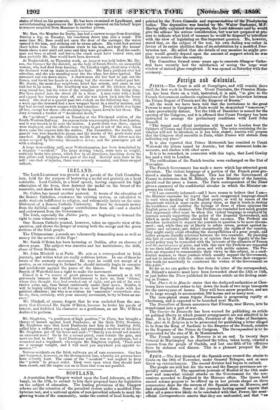IRELAND.
The Lord-Lieutenant was present at a parade of the Cork Constabu- lary, held for the purpose of bestowing a medal and gratuity.on a head constable. Lord Carlisle, in .a brief speech, having expressed his high admiration of the force, then fastened the medal on the breast of the constable, and shook him warmly by the hand.
Dr. Cullen has issued another pastoral. It treats of the education of the Roman Catholics, :condemns the existing system, as calculated to make students indifferent to religion, and vehemently insists on the esta- blishment of a Roman Catholic -University. Hence he demands money from the faithful—small regular contributions from all--and a charter and endowment from the Government.
The Irish, especially the Nation party, are beginning to demand the right to raise volunteer corps.
One Roman Catholic journal, however, takes an opposite view of-the question, and shows the danger of arming both the-orange and the green sections of the Irish people.
The Ultramontane journals are vehemently demanding men as well as money for the service of the Pope !
Mr. Smith O'Brien has been lecturing at Dublin, after an absence of eleven years. The subject was America and her institutions; the drift, abuse of Great Britain.
Mr. John Mitchell is at Paris. He acts as a correspondent to Irish journals, and writes what are really seditious letters. In one of these he treats of the amnesty movement. He says he could not accept of a pardon, as on returning to Ireland he should instantly begin to conspire and confederate against the peace of the Queen. But he says Mr. Smyth of Waterford has-a right to make the movement.
Indeed it is "a source of great pleasure to me, inasmuch as it will grievously torment the British Government to have us, their felons,' whom they thought they had crushed out of sight, and got rid of for ever twelve years ago, thus thrust continually under their noses. Besides, it will be highly edifying to all Europe to see how England deals with her political offenders ; she who is so zealous for 1 amnesties' everywhere else. Go on, then, certainly, with your amnesty movement, to try to force an-an- swer."
Mr. Mitchell, of course, forgets that he -was excluded from the am- nesty that liberated Mr. Smith O'Brien, because he broke his parole of honour, and forfeited his character as a gentleman, an act Mr. O'Brien declined to perform.
Mr. Singleton, "a gentlemen of high position," in Clare, has brought a charge of assault against Lord Dunboyne, at the Quin Petty Sessions. Mr. Singleton says that Lord Dunboyne met him in the hunting field, called him a ruffian and a vagabond, and presented a revolver at his head. Mr. Singleton got off his horse and said—" 'Surely you would not murder an unarmed man ? Go in for a second pistol, come outside the gate, and meet me foot to foot.' Lord Dunboyne said he was no gentleman, but a scoundrel and a vagabond, whereupon Mr. Singleton replied, 'Then send me a message tonight, and I will meet you anywhere you appoint to- morrow.' " Serious accidents on the Irish railways are of rare occurrence. One has just happened, however, on the Downpatrick line, whereby six persons have Ism severely hurt. The cause of the " accident" -was neglect to keep the " points ' in proper order. They were open when they should have been closed, and the engine ran onto. nes that were not parallel.


























 Previous page
Previous page